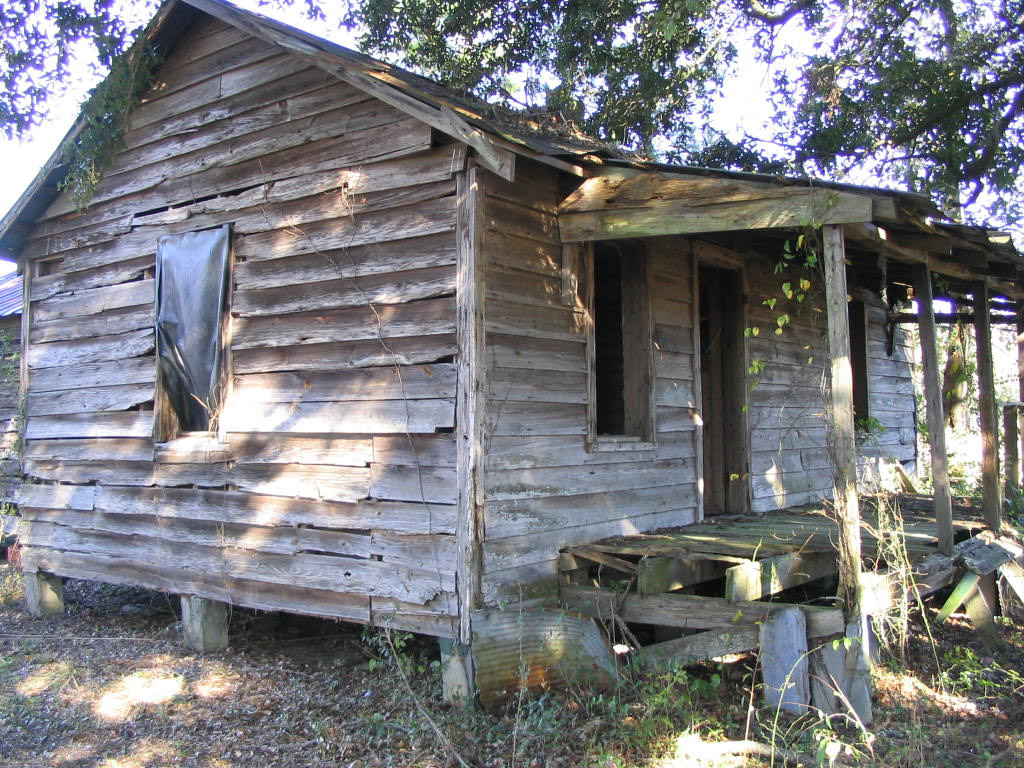Back to Family Memories Index
Return to Home Page
Losing Your Home When Times are Hard
There's a lot of news these days about the mortgage industry crisis and the sad fact that many hardworking people are losing their homes. In Land Between The Rivers, Paul Poston remembers an earlier time when some folks couldn't pay their bills and had to move to less expensive housing - including his own family. (Excerpted and adapted from the original.)
 Dad's struggles really began in the autumn of 1924 when he sold his tobacco crop, put the money in a bank in Johnsonville, then wrote checks to the people he owed. The very next day the bank declared insolvency and closed it doors. All outstanding checks Dad had written were now worthless. We lost everything of any value.
Dad's struggles really began in the autumn of 1924 when he sold his tobacco crop, put the money in a bank in Johnsonville, then wrote checks to the people he owed. The very next day the bank declared insolvency and closed it doors. All outstanding checks Dad had written were now worthless. We lost everything of any value.
The next several years were very difficult. Despite his determination, by 1928 Dad reached a point where he couldn't borrow money for fertilizer or get advances to live on until the crops were sold. He decided to begin sharecropping, a decision that would change our lifestyle for many years.
Mr. King was a successful landowner who already had a dozen or so sharecropper families farming for him but Dad talked with him and arranged for us to work for him. Mr. King would advance Dad some living expenses and we would move into a sharecropper's house.
Cleaning a house was a necessity before you moved into it. The primary chore was ridding the house of bedbugs, lice, fleas and roaches. With no disinfectants in those days, the only effective means of eradicating these pests was by scrubbing with homemade lye soap, pure Red Devil lye, and scalding hot water.
Scrub brushes were made by boring holes into a board and nailing a long handle to the board. Dried corn shucks were stuffed into the holes to form a rough brush. Big wash pots were filled with water and lye and heated with firewood to a boiling temperature. Gourds were used for dippers to toss the hot water onto the walls, ceilings and floors. The walls were scrubbed with the corn shuck brushes and lye soap and the house was rinsed off with clear hot water. We didn't worry about taking the paint off the walls or floor - none of the houses were painted. We waited a couple of days for the house to dry and in early January 1929 we prepared to move.
On moving day, several neighbors and friends came with their mules and wagons. Some loaded up with furniture, some with hay or corn, and some with farm tools. Some loaded up with with chickens and pigs! The mule train finally pulled out with the cows tied behind the wagons.
The older boys went with the wagons but the rest of us traveled in our Model T Ford. It was a cold day and there were no heaters in cars at that time, so the side curtains were put on and we wrapped up in blankets. The distance between the two houses was about eight miles so we should have been able to make it in about thirty minutes, but halfway there it just sputtered and stopped. The Model T did not have a gas gauge and sure enough, we were out of gas. By the time Dad walked to Kingsburg, got gas and walked back, the mule train had caught up with us.
When we arrived at the house, the rush was on to get the cook stove and beds set up before night fall. Some rooms were sealed inside with finished lumber but some just had the outside boards. The floors had cracks so wide you could see the chickens walking around underneath the house. It was exremely cold in winter. Layers of quilts kept us from getting too cold at night, and everyone from babies to grownups wore long-handled underwear.
The next summer a serious epidemic of malaria went through the region. Our windows had glass but no window screens and the mosquitoes really bothered us at night. Malaria was said to be spread by mosquitoes and we were prime targets - most of our family contracted it. Sometimes there were barely enough well members to take care of the sick ones. There was no cure for malaria. A person had to just "hang on" and "wear it out."
It was a hard life changing from working our own farm to sharecropping, but we had no choice but to adjust and adjust we did. The house was by no means a mansion, but it was shelter and we were grateful for it. Dad sharecropped for Mr. King for five years and by the end of the depression, every debt was marked Paid in Full.